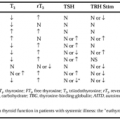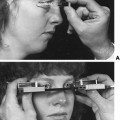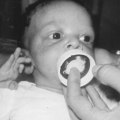CLINICAL DIAGNOSIS
Part of “CHAPTER 45 – HYPOTHYROIDISM“
HISTORY
Adult-onset hypothyroidism usually causes an insidious progression of multiple symptoms and signs, the exact onset of which often cannot be specified by the patient, close family members, or even the personal physician who is seeing the patient on a regular basis (Fig. 45-1 and Table 45-2). This usually is the result of the gradual decline of thyroid hormone levels that occurs in most cases. The physician should seek any history of prior thyroid disease or of therapy directed at the thyroid gland. A history of external irradiation of the head or neck could result in pituitary or thyroid failure. Any history of the use of compounds containing iodine or lithium should be elicited. Iodine deficiency is not a tenable cause of hypothyroidism in the United States because of the commercial practice of supplementing salt and bread with iodine. There may be a family history of thyroid disorders such as Graves or Hashimoto diseases or, more rarely, congenital thyroid disease or dyshormonogenetic goiter. If secondary hypothyroidism is suspected,
symptoms pertinent to other pituitary hormonal deficits should be elicited. A personal and family history of autoimmune processes should be explored in cases of “idiopathic” thyroid failure. Thoracic obstructive symptoms—such as dysphagia, dyspnea, and lightheadedness on raising the arms—may be present because of a large retroclavicular goiter.
symptoms pertinent to other pituitary hormonal deficits should be elicited. A personal and family history of autoimmune processes should be explored in cases of “idiopathic” thyroid failure. Thoracic obstructive symptoms—such as dysphagia, dyspnea, and lightheadedness on raising the arms—may be present because of a large retroclavicular goiter.
Stay updated, free articles. Join our Telegram channel

Full access? Get Clinical Tree






